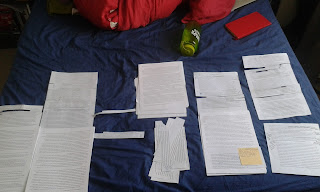The festival was held in the town of Bantry, which was big enough for me to get lost in more than once but small enough that I really shouldn't have been able to. Since it was such a trek the festival let me come across a day early, which meant that I had an evening and a morning in which to get lost.
The reading took place on Whiddy Island, which looks like this:
 |
Most of our nerves were due to neither of us being able to remember if we had a chairperson for the event, which is the difference between an easy-bordering-on-fun undertaking and an event in which I am guaranteed to faint, so we were both incredibly relieved when Sue Leonard turned up on the ferry along with the audience and said that she'd be running the show so we needn't worry. We read, we talked about misogyny and violence and the sea, and all in all it was a lovely way to put The Shore to bed, as this was most likely the last time that I'll get to talk about it more than in passing. The Bantry bookseller managed a little black magic and had copies of The Lauras for sale, which gave Sue and I both a moment of anxiety when we saw them because she hadn't read it and I hadn't prepared it and we were both certain that it wasn't the book that we were meant to be talking about but there it was.
Afterwards I got the chance to chat with some of the audience, which is always fun, and finally met Sara Baume, who wrote Spill, Simmer, Falter, Whither, and with whom I share an agent, a publisher, and a name. And after that I got to hear Zadie Smith and Nick Laird read their work and talk about writing, which brought about something not far off a moment of perfect happiness. Which was good, because after that I discovered that somewhere along the way I'd picked up a case of food poisoning. Which is half the reason why it's taken me nearly a week to say anything on the wonder of West Cork. The other half the reason is the sudden burst of little things to do before The Lauras comes out next week but which I haven't really had the energy to do.
At least I'm back in Reading for a little while - this may be the first Saturday I've woken up here in five weeks - and with any luck will turn back into myself soon.







